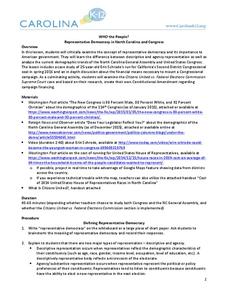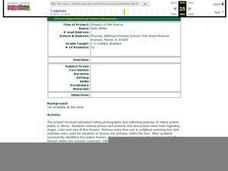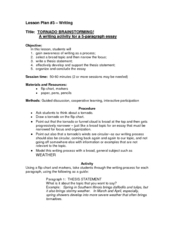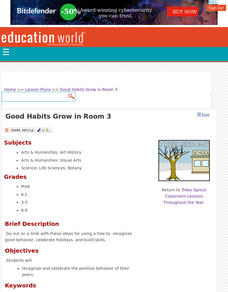Curated OER
Changing Seasons
Explore expository writing and using precise language in this descriptive paragraph writing lesson. Learners brainstorm prior knowledge about the changing seasons in Ohio. They describe seasonal items, view seasonal pictures from...
Curated OER
Saving Sturgeon
Marine biology apprentices interpret data of sturgeon interaction with gill nets. They use the data to calculate the percentage of fish entangled in each twine size to discover if there is any correlation. This is a valuable exercise in...
Curated OER
Double-Entry Journal Writing
Introduce your learners to the concept of a double-entry journal. Talk about how to connect with the text and model an example for them. Using whatever literature you are working with, have scholars choose a quote and make their own...
Cornell University
Too Much of a Good Thing?
Continuing their study of beneficial insects, young entomologists discover where in the world some of these bugs are. By labeling, coloring, and using the scale on a map, pupils explore the territories and arrival of the Asian lady...
Carolina K-12
Who the People? Representative Democracy in North Carolina and Congress
Our elected officials are supposed to represent us, but what does it mean when they aren't like us? Budding citizens explore the demographic makeup of the US Congress, the role of money in political elections, and the Citizens United...
Curated OER
Appreciation Cards
Students discuss jobs in which have impacted their lives directly. They create appreciation cards for a person who they believe needs appreciation. They give their cards to that person and share their reaction with the class.
Curated OER
Graphing San Diego Tides
Students observe the tides in San Diego for one month. Using this information, they graph the tides on a chart along with the phases of the moon. They answer questions related to the graph to end the instructional activity.
Curated OER
Make a Dried Bouquet
Young scholars examine how drying flowers was a popular hobby for Colonial women during the Colonial era in America. They read and discuss an instruction sheet, and create dried-flower bouquets that are hung upside down and tied with a...
Curated OER
Tracking the Salt Front
Students manipulate Hudson River salt front data from October 2004 -
September 2005 to locate the high and low points of the salt front for each month, They determine the range for each month, determine the modal range for each month,...
Curated OER
Level Two ITIP (DM)
Students, while working in groups, recognize how to use a decision making process to make positive and healthy decisions concerning health issues. They brainstorm reasons for choosing drugs, witness a decision making power point and...
Curated OER
No Title
Sixth graders explore, analyze and explain self concept and five ways that alcohol harms the body. They assess the relationship between positive health behaviors and the prevention of injury, illness, disease, and other health problems.
Curated OER
"In Defense of My Race and Country": African-American Soldiers on Why They Are Fighting
Why would an African-American slave fight in the Civil War? Read and analyze primary source documents to understand the ex-slave perspective on fighting in the Union Army. Everything to complete this instructional activity is included.
Curated OER
Water Cycle Reading and Writing
After listening to a story about the water cycle, learners create their own versions of this tale. This is a great way to have your class review the concepts of evaporation, condensation, precipitation, and runoff.
Curated OER
Our Classroom Constitution
Develop a system of classroom rules created by the kids, for the kids with this three-part lesson series on the US Constitution. After learning about the structure of the Constitution and the government it established, young...
Curated OER
Pattern Puzzlers
Students identify triangles, circles, and squares, then show their understanding of patterns by continuing a pattern that contains three different elements. They utilize worksheets imbedded in this plan to practice using these shapes.
Curated OER
Sprouting Sprouts!
Students plant sprout seeds and make observations. In this lesson about planting, students make observations, predictions, and record information. Students analyze how the sprout plants grow and determine if any of the four sprout seeds...
Curated OER
A Dialogue With Your Lettuce
Students, in groups, create questions they would ask about a head of lettuce in their refrigerator (e.g., Where were you grown? Who picked you? What were the working conditions?). They exchange questions with another group and then...
Curated OER
One in a Million
Students participate in an experiment to demonstrate how a substance can have different concentrations in a solution. Students record observations on a dilution chart and determine the concentations of various parts per million.
Curated OER
Beaver Ecology
Students explore the lives of bgeahvers. They identify the physical and behavioral adaptations that help beavers survive in their environment. Students compare and contrast how beavers influence the ecology of both forest and aquatic...
Curated OER
Flowera of the Prairie
Students with severe disabilities view pictures of flowers in a scanning box and identify them. Outside, they locate flowers on the school's property, label and care for them. Students use flower pictures to aid identification.
Curated OER
Tornado Brainstorming
While the focus of this instructional activity is on writing about tornadoes, any topic could be substituted. The instructional activity provides a well-thought out overview of the writing process. Learners come up with a thesis...
Curated OER
Elder Abuse
Students identify types of abusive behaviors that occur in abusive relationships. They comprehend what abusive relationships are. They define elder abuse and neglect.
Curated OER
Good Habits Grow in Room 3
Students go out on a limb with these ideas for using a tree to recognize good behavior, celebrate holidays, and build skills. They recognize and celebrate the positive behavior of their peers.
Curated OER
Mother Nature Has Her Say
Students use their creative writing skills to develop interview questions for Mother Nature. Using writing, they respond to the questions another student developed and use the internet to research any topic they need more information on....

























